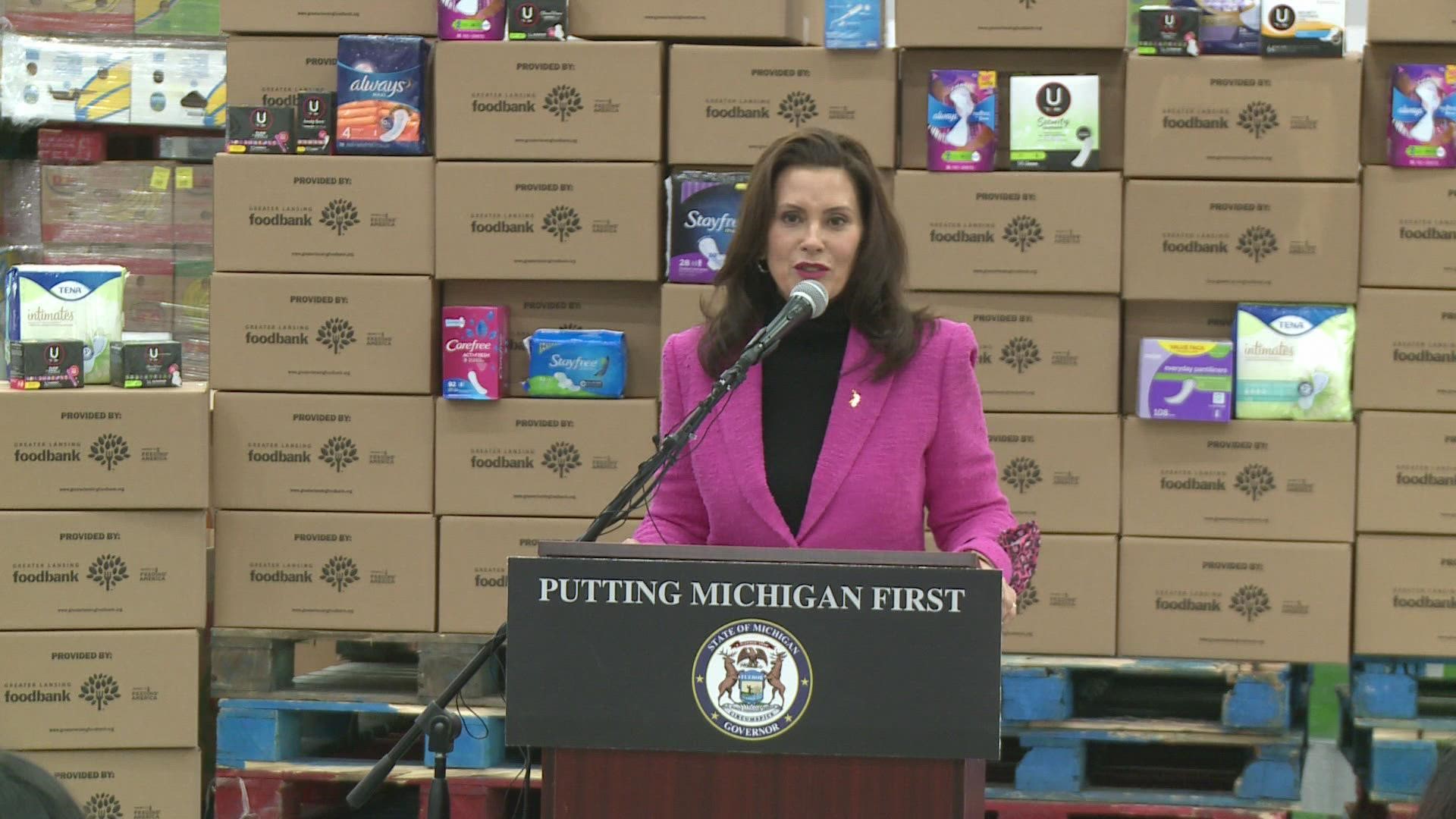LANSING, Mich. — Michigan Gov. Gretchen Whitmer signed the first of two bills into law to eliminate the 'tampon tax' on Thursday. Until then, people in Michigan were charged a sales tax on feminine hygiene products.
It is a bill a career in the making, at least that's what it is for state Senator Winnie Brinks (D-Grand Rapids).
"It's been a long journey, as you said," Brinks told 13 ON YOUR SIDE'S Morgan Trau. "It's been three terms that I've been working on this bill."
In some terms, the bill would be introduced, But Brinks would become discouraged because it was really hard for her to find people who are even willing to have those conversations, she added.
"Over the years, I think people have become familiar with the issue, they started to understand the impact on households, and that it's important for women, for girls, for anybody who menstruates," she said. "But it's also important for households and their finances."
The Grand Rapids-based legislator joined Gov. Whitmer and nonprofit Helping Woman Period for the bill signing, hosted by the Greater Lansing Food Bank. The bipartisan legislation removes the 6% tax on menstrual products that applies to "luxury" goods.
"If we remove those barriers for people who are unable to afford basic necessities, we make them just a little bit more affordable, that means that they're able to show up at work, it means they're able to be at school, it means they're able to go to that job interview," Brinks said. "So we were able to talk about this being a tax cut, putting money back into people's hands so they can do other things that are really important, and sort of the return on investment that you get when you have something like this."
Repealing this "unfair, one-sided" tax is the right thing to do, Whitmer said.
"Over the course of a lifetime, the average menstruating Michigander will use 17,000 tampons, that's 456 periods, costing seven to $10 a month, adding up to between $3,360 and $4,800 over the lifetime," the governor added. "By slapping a tax on top of all of that essential spending, we're taking resources away from families that could have gone toward paying the bills, putting food on the table, or saving for a car or for a home or an education or retirement."
This repeal will also make our tax code more equitable, she said.
"[It's] Helping people who have been disproportionately impacted in this economy, and we're talking about especially women and people in lower-income, she added. "This is a step toward empowering and supporting women in this economy and menstruating Michiganders.
But we need to think about how do we do more to ensure that women [who] have kids are able to make the most important economic decision in their life, which is when and whether or not to start a family."
Whitmer secured funding in the latest budget to send an additional 105,000 children to no or low-cost child care, which will help get parents back into the workforce, she added. Also, she recently fully funded two programs: Michigan Reconnect and Future for Frontlines. These will put 167,000 Michiganders on tuition-free path to higher education or skills training.
On the flip side, critics say eliminating the tax on menstrual products will result to seven million dollars of lost revenue annually. 13 ON YOUR SIDE asked both Whitmer and Brinks about that.
"So seven million, in the context of the state budget, is an important amount, most certainly, I don't want to minimize that." Brinks started. "But it's also a small amount in the grand scheme of the state budget."
When we asked about the impact of the lost revenue, Whitmer said the fairness and ensuring that people who menstruate are not punished for a biological function outweighs rearranging the general budget.
"In terms about the overall size of the budget, it's not a massive amount and is 100% the right thing to do," she said.
In the 2022 budget proposal, Whitmer asserted that the School Aid Fund wouldn't be impacted by the loss of the seven million. They will be pulling from the general fund, Brinks said.
"I don't think I'll ever walk through this aisle in the grocery store without thinking about this day," Brinks added. "I am so proud."
Men's personal products, such as Viagra, have never suffered from the same toll. That is one of the main arguments against the tampon tax. Menstruators don't choose to bleed, and half of the Michigan population has no choice in that biological function.
.

